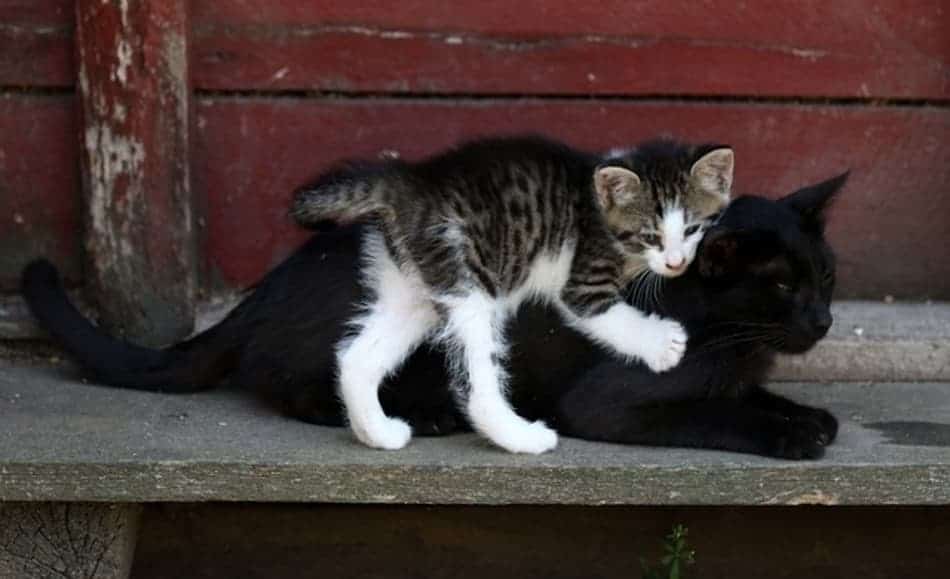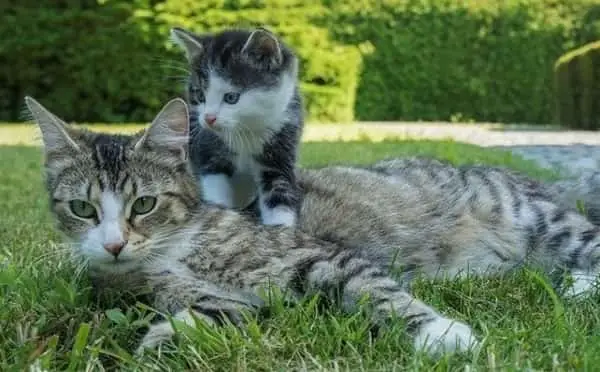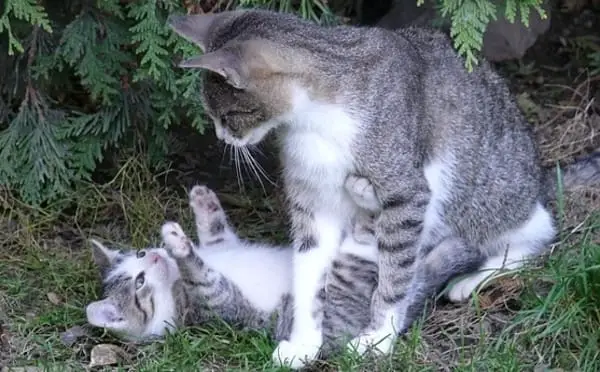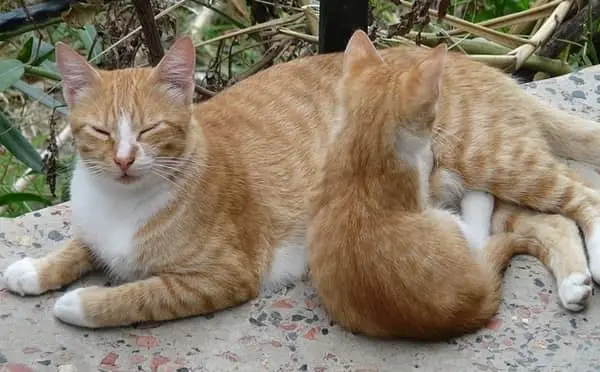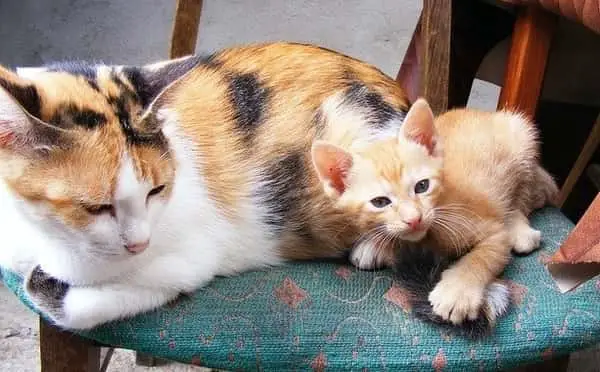It is always a joyous occasion to bring a new pet, especially a kitten, into your home. Sometimes, however, it can be a little stressful for other residents of the home, like an older cat who already considers itself king or queen of the hill.
So, why does my kitten follow my older cat around? The most likely reason is because the kitten is learning from its elder counterpart, although there are a few more reasons that could be causing this behavior.
In this article we will talk about how kittens learn from their elders, how they need playtime to burn energy, and how important bonding is for your feline friends. Additionally, we will discuss a few ways you can help ease the tension, provide the time your kitten needs, and give your older cat a well-deserved break.
Do Kittens Copy Older Cats?
Kittens, like humans and many other animals, learn early on from their mothers and/or other adult cats in their environments. Many modern wild cat species, including feral cats, teach their kittens everything they need to know within the first few weeks and months of their lives.
Some species are solitary, so they take those lessons with them once they leave their dens, while others live in colonies or prides, where behaviors are reinforced throughout their lives.
In the case of the domestic cat, life is usually largely isolated, even with other pets in the home. While domestic cats do often get along with housemates and establish ranking orders within the home, most cat owners know that it can be difficult and time consuming to introduce new members of the family to a household.
However, when you do bring a new companion home, a kitten is likely the best option as they will pose the least perceived threat to your older cat or cats, who likely are territorial by nature. If you have a new kitten in your home who is acting as your older cat’s shadow, it is likely trying to learn from its elder, aloof as the elder may be.
In the early stages of a kitten’s development, most of its learning process is accomplished through observation. When it is very young, this is usually observation of the mother, however, once it is separated from the mother and its littermates at around 12 weeks of age, it will usually focus on another adult cat (and/or human!) in its home.
This is especially true of kittens who were removed from or lost their mothers at a younger age.
Things your kitten is absorbing like a sponge from your older cat are social skills and boundaries, such as acceptable bite pressure, when “enough is enough” during roughhousing and playing, and what certain vocalizations mean.
Further, kittens will learn about safety (i.e., using caution when approaching strange animals or humans), play, grooming, and the ranking process within a multi-cat household. Even though most cat species are solitary, domestic cats do tend to form a “rank order” or hierarchy within a household.
It is important for you, the human “staff member,” to remember this when you bring in a new kitten and be sure to reassure your older cat that it is still head of the household. Your kitten following your older cat around is not necessarily a bad thing, as they are essentially learning how to be a cat, which they need!
Aside from learning “how to cat,” your kitten may also be shadowing your older cat because it simply has so much energy to burn.
Burn, Kitten, Burn
Because of all the growing and learning kittens are doing, they tend to have tons of energy packed into those fluffy little bodies. Naturally, they will seek out plenty of outlets through which to burn that energy.
Being predatory by nature, much of this ends up manifesting itself through play “hunting,” in other words, a lot of jumping, climbing, pouncing, biting, chasing, and wrestling. When your kitten is tailing your older cat around the house exhibiting these behaviors, it likely is trying to play and burn off its endless energy.
These behaviors are completely normal in kittens, so do not fret too much if your kitten seems extremely hyperactive, as it would be more worrisome if they did not behave this way.
Your older cat, however, may not feel the same. Whether because it is still adjusting to having the newcomer in its territory, or because it is simply tired, your older cat may seem reluctant to indulge your kitten in these behaviors all the time.
That is part of where your older cat’s lessons, discussed above, will come into play—teaching your kitten boundaries. It may do this with a light swat or a vocalization or sometimes with some play fighting. In either case, do not worry, your kitten is learning the way it needs to learn.
Nevertheless, when your older cat tires of imparting wisdom upon your kitten, chances are your kitten is still going to have a substantial amount of energy to burn. It would be a good idea to have some backup energy-burning activities planned for your bouncing baby cat, for your sanity, the sanity of your older cat, and of course for the benefit of your growing kitten.
Provide plenty of enriching toys for your kitten, whether store-bought or homemade. (Spoiler alert: you can spend all the money in the world on fancy cat toys, and they will still prefer the wadded-up newspaper.)
Engage in play that focuses on the toys, and not your hands or body, as the subject of the kitten’s energies—this will ensure the kitten understands that toys are okay to bite, but hands are not.
Provide a lot of scratching surfaces throughout your home as well—scratching is an excellent way for your kitten to burn off energy, and ideally it should be done on posts made of natural material or cardboard instead of your nice furniture or your leg.
Offering perches placed throughout the home or along windows is another great enrichment tool for your kitten. As your growing feline friend plays and explores, they likely will find themselves tiring enough to eat and settle down, offering you and your older cat a break.
Learning and playing go hand-in-hand when it comes to growing kittens, along with one more important thing—bonding.
Bonding and Imprinting
When you bring a new kitten into your home, it is usually a happy and joyous occasion for you and your family members or housemates. However, it can be somewhat stressful for the kitten, not to mention your more mature cat or cats that already live there.
Kittens are highly dependent upon and attached to their mothers and littermates, so when they are separated from them to go to their new homes, it can be traumatic. Bonding with a new cat and human (your kitten likely will bond with both of you!) can help lessen the impact of that trauma.
When your kitten follows your older cat around, in addition to playing and learning, it likely is trying to bond with another creature for comfort after being separated from its mother. Again, this is normal behavior and should be encouraged for the wellbeing of both your feline friends.
You want stress to be at a minimum for your older cat, and of course you want your kitten to feel safe and welcome in its new home. You can help a great deal in this endeavor by spending plenty of time playing and interacting with your new kitten so it can “imprint” on both you and your older cat.
While the semantics behind this “imprinting” are debated in the veterinary community, what is essentially happening is your kitten has identified your older cat and you as its surrogate parents and caregivers.
In addition to helping the kitten move past its initial moving-related stress, it also helps with intellectual and social development. In the long run, this kind of healthy development will help your kitten be more well-balanced, happier, and less anxious in the future.
Hopefully, reading through this information has reassured you that your kitten’s behavior is normal and no cause for worry. However, you might be wondering how you can help your older cat adjust and make sure they are still feeling safe and loved.
Refereeing
To make sure both your kitten and your older, established cat feel safe, welcome, and loved in their environment, you likely will have to do some refereeing. We have already discussed providing plenty of interactive playtime with your kitten—doing this will go a long way in preventing your older cat from getting burned out with too much kitten time.
Having lots of toys available will also provide a distraction for your kitten to enable your older cat to retreat to a quieter, safer space for some me-time.
Speaking of, make sure you provide your older cat with at least one or two places in which it can seek sanctuary from your rambunctious kitten, such as a high perch your young one cannot reach, or a separate room only your older cat can access.
While your older cat is taking a well-deserved break, take your kitten for some playtime by itself, so it is nice and calm when the older cat is ready to come back.
Further, reward good behavior from both kitten and older cat with treats, which will help them associate being nice to one another with positivity. During playtime, reward each cat multiple times (but always at the same time) during the session when they play well together or share toys.
If, during a particularly rowdy play session, your kitten just is not getting the message (and there will be plenty of times it will not—it is still just a baby!) put it in a kitten time-out.
Without yelling or scolding, which may compel your kitten and/or cat to associate one another with negativity and fear, gently pick up your kitten and move them to a designated room or crate, to stay quietly by itself for no longer than five or ten minutes.
Do not give the kitten any attention while it is in its time out, and keep in mind you may have to do this multiple times for the kitten to grasp the lesson, but never fear, it will learn!
Remember to exercise plenty of patience with your feline friends, as this new phase is unfamiliar and potentially stressful for both. Be sure to spend as much time with your older cat as you do your new kitten to reassure them that they are still loved and still the head honcho in your home.
If you are patient and calm with both cat and kitten and allow them to get to know one another on their own terms and in their own time, your household will eventually calm down and settle into a routine.
Conclusion
If your new kitten spends all its time being your older cat’s shadow, it likely is trying to learn from its elder. Kittens learn primarily through observation and rely on you and other cats around it to teach it how to be a cat! Further, kittens are extremely high-energy and love to play pretty much all the time.
So, following your older cat around and attempting to play is just your kitten being a kitten. Additionally, your kitten needs to bond with you and your older cat, as it might be stressed or anxious following its move.
Finally, all these things considered, you may end up needing to fill the role of referee to ensure both kitten and cat feel safe and welcome in your home. Be patient and extend some grace to both your feline friends and you will have a harmonious household in no time.

